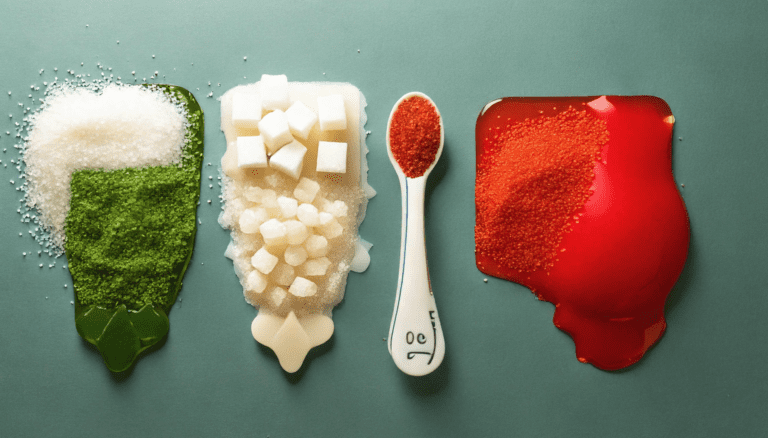Managing blood sugar is a daily challenge for diabetics, and artificial sweeteners are often marketed as the perfect solution for reducing sugar intake without sacrificing taste. But how do these sweeteners actually affect blood sugar? Can they truly be trusted, or do they have hidden effects? In this guide, we’ll explore how artificial sweeteners affect blood sugar, the pros and cons of different types, and how diabetics can safely incorporate them into their diet. Whether you’re using aspartame, sucralose, or stevia, understanding how these sugar substitutes impact your glucose levels is key to managing your health effectively.
Summary
Artificial sweeteners, like aspartame, sucralose, and stevia, have minimal impact on blood sugar levels, making them ideal for diabetics. However, some sweeteners may trigger insulin responses or cause digestive issues, so it’s essential to choose the right one for your health needs.
What Are Artificial Sweeteners?
Artificial sweeteners are chemical compounds that mimic the sweetness of sugar but provide little to no calories. These sugar substitutes are frequently used in products like diet sodas, sugar-free snacks, and desserts. Unlike regular sugar (sucrose), artificial sweeteners are much sweeter, meaning that only small amounts are needed to achieve the desired sweetness in food.
There are several common types of artificial sweeteners, including aspartame, sucralose, saccharin, and acesulfame potassium (Ace-K). These sweeteners are typically zero-calorie or low-calorie and are marketed to individuals looking to reduce their sugar intake, manage weight, or control diabetes. However, their impact on blood sugar levels can vary depending on the type of sweetener and individual health conditions.
Artificial sweeteners are approved by health agencies like the FDA, and many are considered safe for long-term use. Despite this, some researchers have raised concerns about the long-term effects of these compounds, particularly when consumed in large amounts.
How Artificial Sweeteners Affect Blood Sugar
One of the biggest advantages of artificial sweeteners is that they generally have little to no impact on blood sugar levels, making them suitable for people with diabetes. Unlike regular sugar, which causes a rapid spike in glucose and requires insulin to metabolize, artificial sweeteners pass through the digestive system without affecting insulin production or blood glucose levels.
However, not all artificial sweeteners are created equal. Some studies suggest that certain sweeteners, such as sucralose, may still trigger an insulin response in certain individuals, which could affect blood sugar regulation over time. Additionally, some artificial sweeteners can alter the gut microbiome, which may indirectly influence blood glucose levels and insulin sensitivity.
While artificial sweeteners can be a useful tool for managing diabetes, it’s essential to understand their potential effects on the body. Consuming them in moderation and paying attention to how they affect your glucose levels is key to using them safely.
Common Types of Artificial Sweeteners and Their Impact on Blood Sugar
Here’s a comparison of some common artificial sweeteners and their effects on blood sugar:
| Sweetener | Impact on Blood Sugar | Calorie Content | Usage |
|---|---|---|---|
| Aspartame | No direct impact | 0 | Diet sodas, sugar-free foods |
| Sucralose | Minimal impact | 0 | Baked goods, drinks |
| Saccharin | No direct impact | 0 | Sweeteners, soft drinks |
| Acesulfame K | No direct impact | 0 | Sodas, baked goods |
| Stevia | No impact | 0 | Natural sugar substitute |
- Aspartame: Aspartame is widely used in diet sodas and other sugar-free products. While it doesn’t raise blood sugar levels, it does contain a small number of calories, though it is not enough to significantly impact weight or blood sugar control. It is widely considered safe for diabetics but is not recommended for individuals with phenylketonuria (PKU).
- Sucralose: Found in many sugar-free products, sucralose is about 600 times sweeter than sugar. While it does not affect blood sugar in most people, some studies suggest it might increase insulin levels in certain individuals. More research is needed to confirm its long-term safety for diabetics.
- Saccharin: One of the oldest artificial sweeteners, saccharin has been used for over a century. It doesn’t affect blood glucose levels but has been linked to digestive discomfort when consumed in large amounts.
- Acesulfame K: Often used in combination with other sweeteners, Acesulfame K is calorie-free and doesn’t raise blood sugar levels, making it a popular choice for diabetics.
- Stevia: Though not technically an artificial sweetener, stevia is often used as a natural sugar substitute. Extracted from the leaves of the Stevia rebaudiana plant, it has no impact on blood sugar and is commonly used by people with diabetes.
Are Artificial Sweeteners Safe for Diabetics?
For diabetics, artificial sweeteners can be a great tool to help control blood sugar levels while still enjoying sweet foods and beverages. Since these sweeteners do not cause blood sugar spikes, they allow diabetics to indulge without the risk of hyperglycemia. However, long-term use and over-reliance on artificial sweeteners have raised some concerns.
Studies have found that certain sweeteners may still cause insulin responses in some individuals, even if they don’t raise blood glucose levels. For example, sucralose has been shown to cause minor increases in insulin secretion, which could potentially disrupt glucose control over time. Additionally, altering the gut microbiome through frequent artificial sweetener consumption may indirectly affect glucose metabolism and insulin sensitivity, though more research is needed to confirm these effects.
Despite these concerns, most experts agree that artificial sweeteners are generally safe for diabetics when consumed in moderation. For those who are unsure, it’s essential to monitor how specific sweeteners affect your blood sugar and consult your healthcare provider for personalized advice.
Benefits of Artificial Sweeteners for Diabetics
Blood Sugar Management: The primary benefit of artificial sweeteners for diabetics is that they do not raise blood sugar levels. Since diabetics need to carefully manage their glucose intake, artificial sweeteners provide a way to satisfy sweet cravings without disrupting blood sugar control. For example, switching from regular soda to diet soda sweetened with aspartame or sucralose can significantly reduce daily sugar intake and help keep blood glucose levels stable.
Weight Control: Another advantage of using artificial sweeteners is their role in weight management. Obesity is a significant risk factor for Type 2 diabetes, and reducing calorie intake is crucial for weight control. Artificial sweeteners allow individuals to enjoy sweet flavors without adding extra calories, making them a helpful tool for those looking to lose weight or maintain a healthy weight.
Low Glycemic Index: Artificial sweeteners typically have a low glycemic index, meaning they do not cause rapid blood sugar spikes. This makes them especially suitable for people with diabetes or insulin resistance, as they help to maintain steady blood sugar levels throughout the day.
Potential Risks and Side Effects of Artificial Sweeteners
While artificial sweeteners offer many benefits, they are not without potential risks. Some individuals may experience digestive discomfort, such as bloating, gas, or diarrhea, particularly with sweeteners like saccharin and sucralose. These side effects are usually mild but can become problematic with excessive consumption.
Another concern is the potential effect on the gut microbiome. Research suggests that artificial sweeteners may alter the balance of beneficial bacteria in the gut, which could impact digestion, immune function, and even blood sugar regulation. While the long-term consequences of this are not fully understood, it’s essential to be aware of the potential risks, especially for individuals with gut health issues.
Additionally, some studies suggest that frequent consumption of artificial sweeteners could lead to increased cravings for sweet foods, which may indirectly affect weight and blood sugar control.
Natural Sweeteners vs. Artificial Sweeteners: What’s Better for Blood Sugar?
In addition to artificial sweeteners, there are several natural sugar substitutes that are gaining popularity, especially among people with diabetes. Stevia and monk fruit are two examples of natural sweeteners that provide sweetness without impacting blood sugar levels. Both are considered safe for diabetics and do not raise glucose levels or insulin production.
While artificial sweeteners offer many benefits, some people prefer natural sweeteners due to concerns about the potential side effects of synthetic compounds. Stevia, for example, is plant-based and has been used for centuries as a natural sweetener. It is completely free of calories and doesn’t affect blood sugar, making it an ideal choice for diabetics who prefer more natural options.
Tips for Using Artificial Sweeteners Safely
- Moderation is key: While artificial sweeteners are generally safe, consuming them in large amounts can lead to digestive discomfort or affect your gut microbiome. Stick to recommended serving sizes.
- Pay attention to individual responses: Different sweeteners may affect your body differently. Monitor your blood sugar levels after consuming artificial sweeteners to see how your body responds.
- Combine with a healthy diet: Artificial sweeteners are best used as part of a balanced diet. Don’t rely solely on sweeteners for sugar control—pair them with nutrient-rich foods and healthy eating habits.
Frequently Asked Questions (FAQs)
Do artificial sweeteners affect blood sugar levels?
Most artificial sweeteners do not directly affect blood sugar levels, but some may trigger an insulin response or alter gut bacteria.
Which artificial sweeteners are best for diabetics?
Sucralose, aspartame, and stevia are commonly used by diabetics as they have minimal impact on blood sugar levels.
Can artificial sweeteners cause insulin resistance?
Some studies suggest that frequent use of artificial sweeteners may affect insulin sensitivity, but more research is needed.
Are there any side effects of artificial sweeteners?
Side effects may include digestive discomfort or changes in gut bacteria, which could indirectly affect blood sugar.
Conclusion
Artificial sweeteners can be a useful tool for diabetics looking to manage blood sugar levels while still enjoying sweet foods and beverages. While these sugar substitutes generally have no direct impact on glucose levels, it’s important to use them in moderation and be mindful of how your body reacts. Each type of sweetener comes with its own benefits and potential side effects, so it’s crucial to choose the right one for your needs and consult your healthcare provider if you have any concerns.
Sources and Citations
- FDA Approval for Artificial Sweeteners
The U.S. Food and Drug Administration (FDA) has approved several artificial sweeteners for use in processed foods. These sweeteners are generally considered safe when consumed within recommended daily limits.
FDA Approval - Artificial Sweeteners and Diabetes Management
The National Institute of Diabetes and Digestive and Kidney Diseases (NIDDK) has conducted research on artificial sweeteners and their impact on diabetes management. Their findings suggest that artificial sweeteners can be a helpful tool for individuals with diabetes who are trying to control their blood sugar levels.
National Institute of Diabetes and Digestive and Kidney Diseases (NIDDK) - Artificial Sweeteners and Heart Health
The American Heart Association has also studied the potential cardiovascular effects of artificial sweeteners. While research on this topic is ongoing, some studies suggest that artificial sweeteners may be associated with a reduced risk of heart disease.
American Heart Association - Impact of Sweeteners on Blood Sugar and Insulin Response
The Journal of Clinical Nutrition has published research examining the effects of various sweeteners on blood sugar and insulin response. These studies have found that artificial sweeteners generally do not significantly raise blood sugar levels or increase insulin production.
Journal of Clinical Nutrition





